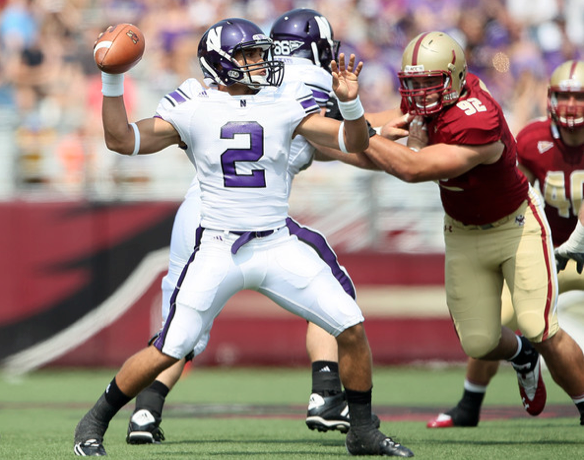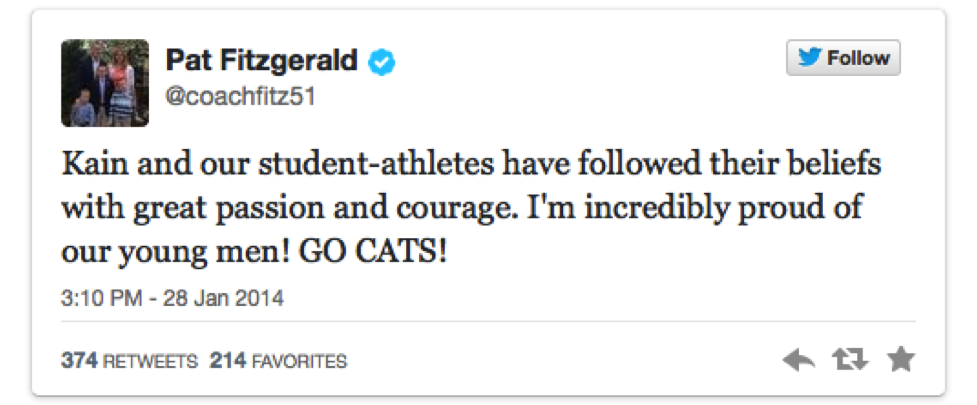A group of football players at Northwestern University has filed a petition with the National Labor Relations Board (NLRB) to certify as a labor union. Their goal, according to spokesman and Northwestern quarterback, Kain Colter, is not to attempt to get college athletes paid. Instead, they seek to improve the conditions under which they play by gaining access to medical care paid for by their schools and guaranteed scholarships despite injury. College athletes, Colter explained in a press conference, provide a service to their schools, which at times gets in the way of their education. The players are supported in their endeavors by the U.S. Steelworkers Union. Pat Fitzgerald, Northwestern’s popular football coach, has tweeted support for his men as well.
Even as Northwestern has continued to insist that football players are not employees, athletic director Jim Phillips said in a statement that:
We love and are proud of our students. Northwestern teaches them to be leaders and independent thinkers who will make a positive impact on their communities, the nation and the world. Today’s action demonstrates that they are doing so.
The National Collegiate Athletic Association (NCAA) has responded to the petition by saying that football players are student-athletes and not employees, as per the definitions stipulated in the National Labor Relations Act. This is because student-athletes voluntarily participate in sports and the purpose of college is not work, but an education. As a result, the NCAA maintains, football players have no right to unionize. A 1953 legal case did classify athletes as employees of a university, forcing the University of Colorado to provide compensation for football injuries. In response, the NCAA invented the term “student-athlete” and forced universities to adopt it, perpetuating the idea that athletes could not be employees.
The response of the NCAA has eerie resonance with graduate student unionization drives wherein university administrators clung to the idea that graduate students were apprentices. As rhetorical scholar Thomas A. Discenna has shown, this definition classified graduate assistants primarily as students and not employees. Obviously, the Northwestern case hinges on the definition of “employee.” Rhetorical scholars remind us that definitions function as arguments, not mere reflections of an objective reality. And both sides in this case will shape definitions about what “employee” means. For instance, the NCAA insists that the fact that football players receive scholarships mean that they’re students, not employees—a contentious point.
Colter in a statement to ESPN shifts the locus of discussion from the definition of “employee” to making visible the labor of football players. Indeed, that sport is a type of labor is often overlooked. (Much as graduate assistant teaching and grading is often invisible to university administrators.) Discourse surrounding college athletics, and even athletics in general, perpetuates the idea that athletes should be motivated by “love of the game,” while demanding medical protections undermines the apparent authenticity of the desire to play for love of the game. College athletes, the saying goes, should be thankful for the opportunity to don school colors and play for their team.
Throughout his statements on the drive to unionize, Colter has made visible the impact of football on the body. An attempt, I contend, that helps listeners to see sport as a type of labor. A particularly dangerous type of labor with lasting effects—a rhetorical move that dovetails with recent discussions about concussions in football. Football is also a labor that takes a great amount of time and practice, as Colter makes clear. While football players may, and often do, love the game, they’re still performing work. This work is precarious as well, given high injury rates and short careers.
Likewise, by arguing that football players are already paid to play for their schools through scholarships Colter equates playing football with a common definition of labor, that one receives wages as a result of performing it. He argues as well that providing the service of performances in football games for their schools oftentimes requires players to miss class, actually getting in the way of the educational goals espoused by the NCAA. Scholarships are granted for athletic, not educational, abilities. One can’t, he argues, skip practice to go to class. Here, we see Colter undermining the “student-athlete” label given by the NCAA by showing “athlete” and “student” to be at odds.
I applaud the unionization drive of Northwestern athletes, and I hope it begins to reform a broken NCAA system. (However, it is important to note that even if successful, the impact of this case may be limited given different regulations for public and private schools.) While this may eventually spiral into a broader discussion about paying student athletes, I am immensely sympathetic to Colter’s claim that having “a seat at the table” would be a significant win against the “dictatorship” that is the NCAA. It is important to realize, however, that while the work football players perform is dangerous, all work exists in hierarchies of value often linked to other forms of privilege. Even as we applaud their efforts, we should remember the unionization drives of those facing other types of precarity like deportation who may not have access to the lawyers and press coverage that this high-profile case has received.
The next step is an NLRB hearing, which will determine whether football players are employees with the right to unionize. This hearing is set for February 18. Regardless of the verdict, there will likely be appeals. It will be months, if not years, before this high-stakes case is resolved.




